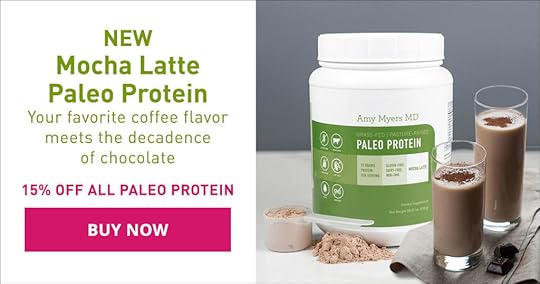Amy Myers's Blog, page 59
April 13, 2018
Quick and Easy Instant Pot Zoodle Pho


Pho is a traditional Vietnamese soup dish that is absolutely packed with nutrient-dense foods, and with an Instant Pot, it’s super simple to whip up even on a busy weeknight!
My Quick and Easy Instant Pot Zoodle Pho is an excellent source of gut-repairing bone broth, aromatics, and veggies, and uses spiralized zucchini in place of the typical rice noodles for an extra boost of potassium and Vitamin C!
This pho can be adapted based on your tastes and whatever veggies or herbs you have on hand (try it with fresh mint!). Swap out the bone broth for vegetable broth to make it vegetarian. Alternatively, you can add leftover chicken or beef to boost the protein! Enjoy!
Quick and Easy Instant Pot Pho
CourseAppetizer, Main Dish, Side Dish
ProtocolAutoimmune Solution (AIP), Candida Control & SIBO, Elimination Diet, Paleo, Thyroid Connection
Servings6 people
Ingredients
1Tbsp
avocado oil
2
cinnamon sticks
1
star anise
4
cloves
1tsp
ground coriander
2
yellow onionsquartered
3inch piece
ginger rootcut in half
6cups
bone broth
2cups
filtered water
2Tbsp
coconut aminos
6
carrotschopped
3
zucchinisspiralized
1bunch
fresh cilantrochopped
1bunch
Thai basil
1
limequartered
Instructions
Set Instant Pot to saute. Once warm, add cinnamon, star anise, cloves, and coriander and saute until fragrant.
Add onions, ginger, bone broth, water, and coconut aminos. Close the Instant Pot and set to Soup/Broth. Set timer for 15 minutes.
While soup cooks, heat 1 inch of water in a saucepan to a boil. Add carrots to a steamer basket over boiling water and cook until tender. Set aside.
Once soup is done, let naturally release for 10 minutes before pressing quick valve. Strain soup through a fine sieve. Discard solids (optionally, remove onion and slice up to put in the pho).
Divide carrots and zucchini spirals into bowls and add broth. Top with cilantro, Thai basil, and lime if desired!
The post Quick and Easy Instant Pot Zoodle Pho appeared first on Amy Myers MD.
April 10, 2018
Which Supplements Are Right For Me?


My Registered Dietitian went LIVE on my Facebook page to talk to you about supplements because I know there is a lot of information out there, and it can be hard to know where to start.
She covered why it is so important to take supplements, how to find high-quality supplements, and which ones I have found to be most helpful for anyone with autoimmunity or a thyroid problem, plus my personal favorites!
You can watch the video here:
Below you will find all of the supplements she covered in that LIVE session.
The Essentials (4:20)
If you’re following or have already completed The Myers Way® or just looking to maintain optimal health, here are the four supplements I recommend everyone add to their daily routine.
Multivitamin
Probiotic
Omega 3
Vitamin D3/K2
Autoimmunity (14:00)
These are my favorite supplements to support and strengthen the immune system to reverse autoimmunity and chronic illnesses.
Resveratrol
Glutathione
Curcumin Phytosome
Immune Booster
L-glutamine
Personal Favorites (20:44)
I do not go a day without taking the supplements down below because they keep me feeling my best!
Collagen Protein
Paleo Protein
Coconut Joy Fiber Bars
The post Which Supplements Are Right For Me? appeared first on Amy Myers MD.
April 9, 2018
‘I Appreciate You’ Sale – Biggest Savings Ever!

I appreciate YOU! As a big “Thank You,” I’m making taking back your health as easy as possible.
I know exactly what it takes to reclaim your health, and I want to help you do just that!
That’s why this morning I kicked off my HUGE Appreciation Sale!
That means up to 50% OFF across the entire store!
You’ll SAVE up to 50% on ALL supplements, programs, and eBooks now through Thursday April 12th at MIDNIGHT CST!
This is the very first time I’ve ever held an Appreciation Sale, and it’s the best deal I’ve EVER offered, so you’ll want to take advantage before supplies run out!
Remember, all orders over $150 get FREE shipping in the continental U.S., and international shipping is available worldwide!
Our fulfillment center is working overtime to get your orders to you as quickly as possible. However, orders placed later during the sale may take longer to ship. So if you’d like to receive your package faster, be sure to place your order TODAY!
If you’ve been putting off:
Repairing your leaky gut
Tackling your Candida, SIBO, or parasites
Addressing your Autoimmunity
Taking care of Hashimoto’s and thyroid conditions
Promoting your detoxification
Supporting optimal whole body health for you AND your family
NOW is the time to take advantage of a fresh start, and take back your health!
Savings are already applied, no need to enter a coupon code!
**Need help with your order? My Customer Success team is available via phone, live chat, and email to answer any of your questions!
***Due to the high volume of orders, please note that there may be slight delays in shipping.
****Offer valid while supplies last. Limit 5 of each product per order. Cannot be combined with any other offers. Excludes wellness coaching, meal planning tool, and sale items.
The post ‘I Appreciate You’ Sale – Biggest Savings Ever! appeared first on Amy Myers MD.
April 8, 2018
6 Key Nutrient Deficiencies Linked to Autoimmunity


Your immune system is a complex machine, and it can’t function properly without the right fuel. There are six key nutrients that I consider to be the premium fuel for your immune system. If you are deficient in any or all of these key nutrients, your immune system is at risk to go haywire, attacking your body’s own tissues and leading to autoimmunity.
That’s why when a patient with an autoimmune condition comes to me for help, I not only check to see whether infections, toxins, and stress might be sabotaging their immune system, I also check for key nutrients they might be lacking. Restoring optimal levels of these nutrients is an important step in reversing autoimmune disease, and also preventing another autoimmune condition from developing.
6 Key Nutrient Deficiencies Linked to Autoimmunity
Here are the six nutrient deficiencies that research has linked to autoimmune disease, and that I most commonly see in my autoimmune patients.
1. Vitamin D
Even if you live in a warm climate and get plenty of sunlight, your vitamin D levels could be below optimal. This is particularly problematic for autoimmune patients because vitamin D plays a critical role in your immune system. It regulates and prevents autoimmunity by stimulating regulatory T cells, which are responsible for differentiating between dangerous invaders and “self” cells. When vitamin D stimulates these cells, it teaches your immune system to not attack your body’s own tissues, otherwise known as tolerance of self.
Vitamin D also supports your ability to fight off viral and bacterial infections that can trigger or worsen autoimmune conditions.
2. Omega 3s
Because our modern day diet tends to contain more polyunsaturated vegetable oils instead of quality animal fats, many Americans are deficient in Omega 3 fatty acids. Studies have shown that omega 3 oils enhance B cell activation and select antibody production, which can lower the inflammatory response and help your immune system fight off pathogens.1
3. B vitamins
B vitamins do more than just provide energy for our cells. They also control immune function, hormones, mood, sleep, nerves, circulation, and digestion. Vitamin B12, for example, supports the production of white blood cells, which are essential components of the immune system. When you are low in B12, your white blood cell count is lowered, which weakens your immune system and makes it more likely to mistakenly attack your own cells.
4. Selenium
Selenium may be a little-known mineral, however research shows that it is essential for regulating excessive immune responses and chronic inflammation in autoimmune diseases.2 It is also a vital nutrient for proper thyroid function, and studies have shown that Hashimoto’s patients who increased their selenium intake were able to decrease their thyroid antibodies by nearly 64%!3 I talk more about this in my book, The Thyroid Connection.
5. Zinc
Zinc affects multiple aspects of your immune system, from your skin barrier to gene regulation within lymphocytes (a type of white blood cell). In fact, zinc is essential for the production of white blood cells and studies show that people with zinc deficiency are more susceptible to pathogens.4
6. Magnesium
Magnesium, which is important for immune function and heart health, is a mineral most people are chronically low in due to high levels of stress and high-sugar diets (sugar depletes magnesium levels). Magnesium deficiency has been shown to cause an increased production of proinflammatory cytokines, which raise your overall level of inflammation, contributing to autoimmunity.5
What Causes Nutrient Deficiencies in Autoimmune Patients?
Now that we know which nutrients play a critical role in the immune system, let’s look at why autoimmune patients are often low in them.
A Nutrient-Poor and Inflammatory Diet
This one is pretty obvious–if you aren’t eating these nutrients, your body won’t have enough of them. If you haven’t started following any of The Myers Way® protocols, you’re likely eating lots of white flour products, refined sugars, and processed foods. While these foods may taste good, they are completely devoid of nutrients, and what little vitamins they offer typically have to be added synthetically.
In addition to nutrient-poor, processed foods, a diet high in inflammatory foods can also cause nutrient deficiencies. These inflammatory foods, including gluten and dairy, grains and legumes, nuts and seeds, nightshades, eggs, sugar, and caffeine, not only stimulate your immune system, they also cause leaky gut.
A Leaky Gut
We know from Dr. Alessio Fasano’s research that virtually all autoimmune patients have a leaky gut. What you may not know is that when your gut is leaky, the junctions in the intestinal walls that keep your GI lining tight become “loose” allowing food proteins, bacteria, yeast, and viruses to enter the bloodstream. Additionally, some people have blunted villi — the small hair-like projections that absorb nutrients — which means they can’t absorb foods properly and become deficient in vitamins and minerals, even if they’re getting plenty of them in their diet. This causes a wave of inflammation that triggers or worsens autoimmunity.
Gene Mutations
Common gene mutations such as MTHFR significantly reduce your ability to convert certain nutrients that contribute to methylation, including B vitamins, choline, folate, and more. VDR mutations can cause low vitamin D, and mutations that control Sulfation, a liver detoxification pathway, can cause zinc deficiency. If you have one or more of these gene mutations, then you might be getting plenty of nutrients from your diet or supplements, yet your body simply isn’t able to optimally utilize them.
How to Prevent or Overcome Nutrient Deficiencies
Restoring optimal levels of these key nutrients can be done! By upping your dietary intake and addressing the underlying causes of your deficiencies, you can replenish your levels and strengthen your immune system. Here’s what to remember.
Eat a Nutrient-Dense Diet
Getting your nutrients through food is always the ideal route, so you’ll want to add plenty of these foods to your diet:
Vitamin D: fatty fish, grass-fed or pasture-raised proteins, and organ meats
Selenium: garlic, turkey, liver, and red meat
Magnesium: dark leafy greens such as spinach and chard, figs, fish, avocado, and bananas
Zinc: oysters and seafoods, grass-fed beef and lamb
Omega 3: grass-fed meats, fatty fish, flax and chia oil
B vitamins: leafy greens, animal proteins, fresh and dried fruits, seafood, avocados
My upcoming book, The Autoimmune Solution Cookbook, contains over 150 recipes featuring foods that are packed with the nutrients you need to overcome autoimmunity. From Omega 3-rich Honey-Ginger Glazed Salmon to magnesium-dense Zucchini Noodles with Spinach-Kale Pesto, these recipes were specially designed to make autoimmune-friendly cooking easy and delicious! More than just a cookbook, it also lays out the four pillars of The Myers Way® to help you optimize your diet and lifestyle for preventing or reversing autoimmunity. Pre-order your copy today to receive over $150 in FREE bonus gifts!
Repair Your Gut
Repairing your gut is one of the most important steps to take in your autoimmune journey. It will not only improve your ability to absorb nutrients, it will dramatically reduce your inflammation and calm your immune system.
I recommend using the 4R approach to repair your gut:
Remove the bad. Get rid of gut infections and toss all toxic and inflammatory foods.
Restore the good. Add back in the essential ingredients for proper digestion and nutrient absorption, such as digestive enzymes and hydrochloric acid (HCL).
Reinoculate with healthy bacteria. Reestablish a healthy gut flora using probiotics.
Repair your gut. Rebuild the mucosal lining of your gut with L-glutamine and collagen (or bone broth).
You can learn more about the 4R Approach in this post.
Learn About Your Unique Genetic Needs
If you’re curious about your genes and how they can cause nutrient deficiencies, you can order a genetic test through 23andme.com. They send you a kit to collect a saliva DNA sample, and then they provide you with basic genetic information and all of your raw data. You can then enter your raw data into one of several third-party tools to translate it into a report that shows you which genetic mutations you have, and what that means for your health. Livewello is one option, as is Genetic Genie.
Add In High-Quality Supplements
Although optimizing your diet, repairing your gut, and eating for your genetics go a long way, you may need to add in supplements as well. The unfortunate truth is that our nutrient-depleted soil, high-stress lifestyles, and toxic environments make it very difficult to get all of our nutrients from food alone. Fortunately, high-quality supplements can step in to fill the gap.
Here are the supplements I recommend that everyone with autoimmunity take on a daily basis:
Multivitamin: A daily multivitamin to build a foundation of optimal health. The one I carry in my store contains the full recommended levels of selenium, magnesium, and zinc.
Vitamin D: When supplementing with vitamin D, be sure to choose one that combines D3 (the active form of vitamin D) with vitamin K2 because these nutrients are complementary and work together for proper immune, brain, hormone, and bone health. The K2 also prevents calcium buildup in your heart from the use of vitamin D.
Omega 3: Often, Omega 3 supplements come from fatty fish which can be high in mercury. When supplementing make sure that the Omega 3 supplement you choose is from a reputable source that verifies through a 3rd party that they have no detectable mercury in their product.
B vitamins: The best source for this is my Vitamin B Complex which contains all eight B vitamins in a form that is easily absorbable. If you have one or two MTHFR mutations, my Methylation Support includes pre-methylated B vitamins and other important nutrients needed for for methylation.
The post 6 Key Nutrient Deficiencies Linked to Autoimmunity appeared first on Amy Myers MD.
April 6, 2018
Bacon-Wrapped Pears


Can’t decide between sweet or savory? These Bacon-Wrapped Pears have the best of both worlds, and are surprisingly simple to make!
The sweetness of warm pears is complemented by crispy, crunchy bacon, for a mouth-watering appetizer, snack, or even dessert!
Easy and elegant, these scrumptious Bacon-Wrapped Pears are sure to wow your friends and family!
Plus, as a member of our community, ButcherBox has a very special offer for you, including FREE bacon! Now through April 15th at Midnight PST, order from ButcherBox and you’ll receive:
TWO FREE Grass-Fed Filet Mignon Steaks
FREE Heritage Breed Pork Bacon
$10 OFF your total order
+ FREE SHIPPING!
Click here to claim your offer!
Bacon-Wrapped Pears
CourseAppetizer, Dessert, Side Dish, Snack
ProtocolAutoimmune Solution (AIP), Candida Control & SIBO, Elimination Diet, Paleo, Thyroid Connection
Servings2 people
Ingredients
1
pear
4slices
nitrate-free organic bacon
Instructions
Preheat oven to 375F. Line sheet pan with parchment paper.
Cut pear into quarters. Wrap each quarter in 1 slice of bacon. Place on sheet pan.
Bake pears for 30-35 minutes or until bacon is cooked through. Remove from oven and serve warm.
The post Bacon-Wrapped Pears appeared first on Amy Myers MD.
April 5, 2018
Video: What’s in My Suitcase?

Traveling can be hectic for anyone, and sticking with an autoimmune protocol while on the go introduces new challenges. That’s why it’s so important to come prepared!
Since I’ll be jetting to Australia for nearly 4 weeks, I went LIVE on my Facebook page to share with you exactly what I’m packing, including food and snacks for me, Xavier, and baby Elle, toxin-free toiletries, and supplements in case I get “glutened.” I’ll also be sharing what research I did ahead of time to help prepare and show you how I stay on track while traveling!
Resources I mentioned:
Books (0:48):
The Autoimmune Solution Cookbook
Personal Care Products (2:03):
Blue Avocado Travel Bags
Silver Tongue Mouthwash
Beautycounter
Babo Botanicals
milk honey Arnica Balm
Food & Snacks (7:20):
Paleo Protein Powder Vanilla
Paleo Protein Powder Mocha Latte
Collagen Protein
Coconut Joy Fiber Bars
Chewy Chocolate Paleo Bars
Vermont Chipotle Beef Sticks
Grass-fed Perky Jerky
Mighty Beef Jerky
Sea Bear Wild Caught Salmon
Vital Choice Salmon
Plum Organic fruit squeeze packs
Desert Farms Camel’s Milk
Supplements (11:00):
Glutathione
Coconut Charcoal
L-glutamine
EstroProtect
Probiotic 30 Billion
Omega 3 Softgels
Multivitamin
Melatonin
Travel Essentials (13:24):
Amber Glasses
Bucky Eye Mask
PackIt Freezable Lunch Bag
Kleen Kanteen Water Bottle
Baby Products (15:00):
Water Wipes
Chux Disposable Pads
Infant Probiotic
Omega 3 Liquid
Vitamin D Liquid
The post Video: What’s in My Suitcase? appeared first on Amy Myers MD.
April 2, 2018
10 Things Your Endocrinologist Isn’t Telling You About Hashimoto’s


Getting a Hashimoto’s diagnosis can be confusing. You may be wondering what caused it in the first place and if you’ll ever feel like yourself again. You’re not alone. An estimated 27 million Americans have some form of thyroid dysfunction. Hypothyroidism (an underactive thyroid) is the most common form of thyroid dysfunction, and 90% of hypothyroidism patients have Hashimoto’s.
The good news is there is a way to end the constant fatigue, brain fog, weight gain, hair loss, mood swings, constipation, and other symptoms. There are many dietary and environmental causes behind Hashimoto’s, and you can make simple lifestyle changes to overcome it. Most conventional doctors won’t explain or educate you on the lifestyle changes you can make to reverse your condition.
Here are 10 things your endocrinologist won’t tell you about Hashimoto’s.
1. Hashimoto’s is an autoimmune condition, meaning it’s a problem of the immune system.
Despite what your conventional doctor may tell you, Hashimoto’s isn’t actually a problem of your thyroid; it’s a problem of your immune system. The thyroid is the body’s engine, producing hormones that impact every cell in your body. It regulates all of your metabolic functions, from heart rate to temperature to metabolism to your mood. If you have Hashimoto’s, your immune system is malfunctioning and attacking your thyroid, causing it to underproduce its hormones and slowing down all of your metabolic processes.
2. It can be reversed!
If you address the underlying issues that caused your immune system to go rogue in the first place, you can stop its attack on your thyroid, restore optimal function, and eliminate your symptoms. In my book, The Thyroid Connection, I walk you through all five root causes of Hashimoto’s and how to overcome them. For additional information, read 11 Signs You Have Hashimoto’s and How to Overcome It.
3. The first step to reversing your condition is to repair your gut.
Repairing your gut is vital to reversing your symptoms of Hashimoto’s and any autoimmune condition, as 60-80% of your immune system is located in your digestive tract. Leaky gut occurs when your gut lining becomes permeable, as a result of foods (such as gluten, dairy, grains and legumes), infections, toxins, stress and age. If your gut is leaky, toxins, microbes, viruses, bacteria and food particles escape, entering your bloodstream. Through a process called molecular mimicry, your immune system can be fooled into attacking look-a-like molecules that are actually your body’s own tissue, such as your thyroid. You can stop leaky gut by following The Myers Way Leaky Gut Repair Program.
4. Gluten plays a major role in Hashimoto’s and thyroid function.
One of the primary causes of leaky gut is eating an inflammatory diet containing gluten. Gluten produces zonulin, a chemical that signals the tight junctions of the intestinal walls to open up, creating permeability and the release of gluten into your bloodstream. Gluten has a similar protein structure to your thyroid, so your immune system thinks they are the same–inducing molecular mimicry. Your immune system attacks your thyroid as it would the foreign, invasive gluten. This is why I recommend that all Hashimoto’s patients eliminate gluten completely.
5. You may be low in iodine.
Sufficient levels of iodine are necessary for optimal thyroid function. Iodine and tyrosine are the building blocks of your thyroid hormones. Your thyroid converts tyrosine into thyroglobulin and attaches between one and four iodine atoms to create hormones called T1, T2, T3 and T4 respectively. Simply put, without enough iodine, your thyroid can’t produce its hormones. This is why we eat “iodized” salt. Should you take iodine supplements to counteract low levels of iodine? Some researchers advocate mega doses of iodine, whereas conventional physicians argue that large doses of iodine can worsen the condition. I custom formulated a high quality multivitamin with the optimal amount of iodine. You can also increase your consumption of foods that contain iodine including saltwater fish and sea vegetables. I have some great recipes for seaweed salad and other iodine-rich meals in my upcoming cookbook, The Autoimmune Solution Cookbook, coming out May 8th!
Low iodine can be caused by environmental factors as well. Exposure to three chemicals can cause iodine displacement–flourine (flouride), chlorine, and bromine. These chemicals are so similar to iodine that your thyroid will absorb them and store them, therefore “displacing” iodine. This results in your thyroid not having sufficient iodine to produce thyroid hormones, leading to hypothyroidism and Hashimoto’s. For more information, read the article The Iodine & Hashimoto’s Question.
6. Selenium is another key nutrient you may be missing.
Selenium helps the enzyme that converts thyroid hormones from the inactive (T4) hormone to their active state as the (T3) hormone. So, without enough selenium, our thyroid hormones are stuck in their inactive state, causing Hashimoto’s symptoms. Another important function of selenium is to neutralize damaging hydrogen peroxide, which is emitted in the thyroid when the body converts iodide (the form of iodine that we eat) into iodine. Hashimoto’s patients with low selenium levels who increased their intake, saw a 64% reduction in antibodies. Supplemental selenium is also in my high quality multivitamin. For more reference 4 Essential Nutrients to Reverse Hashimoto’s.
7. Toxins in your everyday environment could also be playing a role.
Mercury, perchlorates, and nitrates are other toxins that can result in iodine displacement. These chemicals are similar to iodine, and are absorbed by the thyroid instead of iodine. These toxins can all be present in tap water. To reduce your exposure, you can place a filter on your sinks and shower heads. To eliminate trace amounts of mercury found in the air caused by coal burning plants, you can filter indoor air with a HEPA filter. Mercury can also be found in pesticides, fish, cosmetics, amalgam dental fillings and vaccines. A diet full of organic food and low-mercury fish along with non-toxic body products will limit your exposure. You can also have a biological dentist safely remove amalgam fillings, and make informed decisions about vaccines. It’s also important to support detox pathways, which I explain in this article.
8. You may have underlying infections fueling your condition.
Infections specific to Hashimoto’s patients include herpes viruses, Esptein-Barr, Hepatitis C, Helicobacter pylori, and Yersinia enterocolica. Unfortunately, these infections often have no symptoms, so you don’t even realize you have them. These viruses and bacteria can be detected by your doctor through various tests and treated.
9. Relieving your stress can support your thyroid.
We all experience some temporary stress, yet when stress gets too high, the adrenal glands produce a series of stress hormones including cortisol. These hormones slow down important body functions such as digestion, immune response, and thyroid hormone production and distribution. When the temporary stress subsides, the body returns to normal functioning.
Chronic stress however puts your adrenals on overdrive for extended periods of time continuously flooding your body with cortisol. This can lead to adrenal fatigue, which can be damaging to the thyroid. Cortisol causes slowed thyroid hormone production, an inability to convert thyroid hormones to their active state (T3), and thyroid hormone resistance. By relieving stress, you are supporting your thyroid and stopping the adverse effects of stress. For more information, read the article Is Stress Causing Your Hashimoto’s.
10. You have options when it comes to thyroid medication, and it’s important to find the one that works for you.
Thyroid treatment is not a “one size fits all” process. It does not include harsh drugs. It involves taking supplemental doses or replacement thyroid hormones that are necessary for your thyroid to function properly.
Thyroid treatment can include synthetic medications or compounded medications. The most common Hashimoto’s treatment is synthetic inactive (T4) hormone medication, such as Synthroid® or Levoxyl®. The downside of T4 medications is that, unlike your real thyroid, they don’t provide any active (T3) hormone. Many patients have difficulty converting T4 to T3, because of adrenal fatigue or nutritional deficiencies, meaning no matter how much T4 they take, their T3 levels will remain low, and they’ll continue to experience the negative symptoms of Hashimoto’s.
If you are a person who is not converting T4 into T3 well, then T3 medication can be prescribed including T3 (Cytomel®). Another option is compounded T3 medications, which are custom-prepared at the exact strength and dose requirements of the patient, as specified by their doctor. Compounded T3 medication can be prepared in a time-release formula to avoid the hormone rollercoaster patients often experience on Cytomel® and similar drugs. Desiccated thyroid medications, such as Amour®, WP Thyroid®, and Nature-Throid®, provide the full range of thyroid hormones, including T4, T3, T2, and T1. Because desiccated thyroid medication is the most complete treatment option, and the most similar to your body’s natural thyroid process, it is a good choice. For more information, read Which Thyroid Medication is Best for Hashimoto’s. Finding your treatment protocol takes patience and collaboration with your doctor. Regularly check your levels and listen to your body.
Remember you can beat Hashimoto’s symptoms for good! Click here to get the tools!
The post 10 Things Your Endocrinologist Isn’t Telling You About Hashimoto’s appeared first on Amy Myers MD.
March 31, 2018
6 Ways Sugar Wrecks Your Health & How to Beat Sugar Cravings
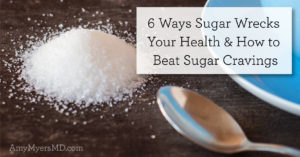
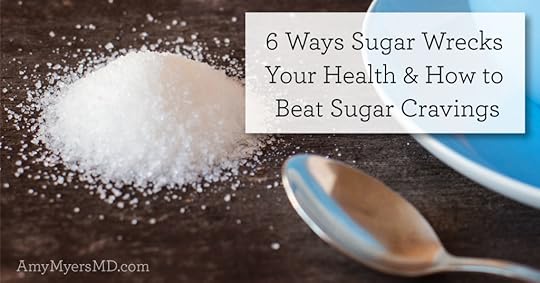
Sugar does more than just rot your teeth. It wreaks havoc on your gut, your skin, your joints, your mood, and sets you on the path to chronic illness. There’s no doubt that sugar is bad news, yet Americans still consume an average of 20 teaspoons of sugar daily. That’s an astounding 66 pounds of added sugar per person annually.1 If you’re looking to optimize your diet, read on to find out the many ways sugar wrecks your health along with some helpful strategies to beat sugar cravings and kick the habit for good.
Hidden Sources of Sugar
Let’s face it, sugar is one of life’s sweet treats, a “guilty pleasure” that is difficult to avoid over the course of your day if you’re not actively checking ingredient labels. Aside from the usual suspects such as baked goods, soda, and fruit juice, sugar can be hiding in everything from pasta sauce to yogurt to salad dressing.
Because sugar is so ubiquitous, your best bet is to make your own food and condiments in order to minimize or eliminate it completely from your diet. (I have some great tips for making pantry staples from yogurt to nightshade-free ketchup in my upcoming book, The Autoimmune Solution Cookbook, coming out May 8th!)
When you don’t have time to make your own and need the convenience of packaged goods, keep the following list of common hidden sources of sugar in mind and always read ingredient labels closely:
Common Hidden Sources of Sugar
Granola and Cereal
Protein Bars
Yogurt
Gluten Free Bread
Premade Sauces and Dressings
Nut and Seed Butters
Non-Dairy Milk
Protein Powders
Sugar can also hide under dozens of different names on food labels. Here are the most common names for hidden sugar in food products to help you make careful choices at the grocery store:
Common Names for Sugar on Ingredient Labels
Ingredients ending in “-ose” (sucrose, fructose, sucralose)
Ingredients ending in “-ol” (sorbitol, inversol, carbitol)
Brown rice syrup
Concentrated fruit juice
Corn sweetener
Diglycerides
Disaccharides
Evaporated cane juice
Fructooligosaccharides
Isomalt
Maltodextrin
Malted barley nectar
Sucanat
The good news is that the FDA now requires most companies to list added sugars on packaged goods, so you’ll know how much sugar is naturally occurring in the foods used to make the products, and how much is just empty calories.
So how much is too much? The American Heart Association recommends that women consume less than 25g, and men less than 36g of added sugar per day.2 To put that in perspective, there are roughly 4g of sugar in a teaspoon, so that would be less than 6 teaspoons a day for women and no more than 9 teaspoons a day for men. Remember that this is the upper limit, and I recommend aiming for even less than this amount to achieve optimal health.
Your Body on Sugar: Inflammation, Autoimmunity, and Chronic Illness
In our hunter-gatherer days, a piece of fruit would be a welcome source of quick-release energy. Refined sugar, however, is a modern invention that our bodies did not evolve to have the capacity to deal with properly. We are also consuming far greater quantities of sugar than we were ever designed to handle. In the course of a normal day, your body simply doesn’t need all those quick, intense bursts of energy that sugar provides, especially since you aren’t running from predators or hunting down your own food.
Not only is added sugar unnecessary for proper functioning, it’s actively detrimental to your overall wellbeing. Let’s take a look at some of the many ways sugar wreaks havoc on your health.
1. Autoimmune Disease
Sugar affects your entire body because it is an inflammatory food, and inflammation is at the root of nearly every chronic illness. Studies have shown that a high-sugar diet is linked to joint pain and increases your risk of developing rheumatoid arthritis.3 That’s because excess sugar in your bloodstream generates free radicals, which damage your cells and trigger an inflammatory immune response.4 The more inflammation you have, the further up you are on the autoimmune spectrum, and the closer you are to developing a full-blown autoimmune disease (or a second, or a third).
2. Insulin Resistance
Excessive sugar intake causes your pancreas to overproduce insulin in an attempt to balance your blood sugar.5 Eventually your liver becomes overwhelmed and develops insulin resistance. Insulin resistance is the most powerful predictor of developing type 2 diabetes, and can also lead to heart disease, stroke, fatty liver, and polycystic ovary syndrome.6,7
3. Candida Overgrowth
What you eat has the power to alter your gut microbiome, and research shows this can happen as quickly as 18-20 hours.8 This is important because a diet high in sugar feeds the yeast in your gut, which can lead to Candida overgrowth. Candida overgrowth causes a wide range of health issues, including vaginal infections, seasonal allergies, digestive issues, and skin or nail fungus. Candida also causes leaky gut and can trigger or worsen autoimmune diseases by suppressing the immune system and prolonging inflammation.9 And because yeast feeds on carbohydrates, once you have an overgrowth, the Candida will cause you to crave sugar even more, leading to a vicious cycle that’s hard to break.
4. Premature Aging
Skin health is more than just vanity. Clear, glowing skin is an indication that everything underneath is functioning optimally.
Sugar messes with your skin in a few critical ways. According to the American Academy of Dermatology, foods with a high glycemic index such as sugar or carbohydrate-rich foods can cause breakouts.10 Sugar also binds to proteins in your bloodstream and forms molecules known appropriately as AGEs (advanced glycation end products).11 AGEs damage your skin’s elastin and collagen (the protein that keeps your skin firm and plump), leading to wrinkles and saggy skin.
5. Addiction and Depression
Sugar not only affects your physical health–it has a huge impact on your psychological health as well. That’s because sugar is essentially a drug in the way it interacts with your brain’s reward pathway. When you eat sugar, your dopamine levels surge in the same way they do with heroin (though not quite as intense).12 Eventually your brain gets addicted and requires more and more sugar to get the same amount of pleasure, which is why eating sugar makes you crave even more sugary foods.
Because sugar actively depletes your dopamine levels, a high-sugar diet can also lead to depression. A study that followed 8,000 men over 22 years found that those who ate more than 67g of sugar daily were 23% more likely to be diagnosed with depression than those who ate 40g or less.13
6. Heart Disease
Heart disease is the leading cause of death for both men and women.14 Researchers found that people who eat the most added sugar (at least 25% of their daily calories) are twice as likely to die from heart disease than those who get less than 10% of their total calories from sugar.15 Sugar causes your artery walls to grow faster than normal and tense up, leading to heart attacks, stroke, and cardiovascular disease. Eating less sugar can also help lower your blood pressure, which is a major risk factor for heart disease.16
How to Beat Sugar Cravings
Now that you’re convinced that cutting back on sugar is one of the best ways to attain optimal health, you’ll need to arm yourself with strategies for overcoming those dreaded sugar cravings. Fortunately, once you’re no longer relying on sugar for a quick fix, you will begin to crave sugary foods less and less! Here are a few tried-and-true measures you can take to curb those cravings.
1. Manage Stress
You’re probably all too familiar with the phenomenon of stress-eating. After a disagreement with your spouse, a hard day at the office, or any other emotionally troubling event, you find yourself reaching for the pint of ice cream, the candy bar, or another sweet treat that will trigger the release of feel-good chemicals in your brain. Don’t beat yourself up–it happens to the best of us! And it has nothing to do with willpower. In fact, stress-eating is hard-wired into our systems!
When you’re stressed, your cortisol levels shoot up. Cortisol is your body’s “fight-or-flight” hormone that helps mobilize sugars to your muscles in order to give them the energy to fight or run away from the stressor (e.g. a lion).17 However, this evolutionary response does not align with our modern day stressors, which are chronic and largely psychological. If you are stressed out all the time as many of us are, your body thinks it needs a constant supply of sugar to fuel your muscles to overcome the obstacle at hand, causing you to “stress eat” loads of sugary foods.
The solution to this is to manage your stress with self-care. Find ways to reduce your stress levels, whether it be through meditation, a walk in nature, a fun hobby you enjoy, or pampering yourself with a massage. When you feel a sugar craving coming on, try a stress-busting activity instead, even if it’s just sipping on a warm cup of tea!
2. Add Protein and Healthy Fats into your Diet
Another strategy for beating sugar cravings before they arise is to nourish yourself with filling protein and healthy fats. If you’ve ever experienced the irritability that comes with low blood sugar from not eating (known popularly as being “hangry”), then you know why it’s tempting to reach for sugary food that will get digested rapidly to bring your blood sugar back up as fast as possible. However, this inevitably sends your body on a rollercoaster of insulin spikes and crashes, leading to even more cravings.
Instead, be sure to include some protein and healthy fats with every meal (and as a between-meal snack, if necessary) to keep your blood sugar stable and help you stay full and satisfied until your next meal. A protein shake with some added fat such as coconut milk or avocado is a perfect way to curb those sugar cravings. (If you’re a coffee fan, check out my NEW Mocha Latte Paleo Protein for a healthy alternative to a frappe!)
3. Build Your Supplement Arsenal
There are a number of supplements you can take to support your efforts to tame sugar cravings. The first I would recommend is L-glutamine. L-glutamine keeps your blood sugar levels stable throughout the day and supports a balanced insulin response. By curbing sugar cravings, it also helps you maintain a healthy weight.
B-vitamins such as thiamin and niacin are also beneficial for beating sugar cravings because they help your body deal with stress and metabolize nutrients (which are often depleted by stress) more efficiently.
Finally, chromium is a trace mineral that prevents cravings for carbohydrates, supports optimal fasting and post-meal blood sugar levels, and assists in mitigating adrenal cortisol production. Chromium also helps you maintain normal insulin sensitivity. You can find chromium along with some necessary B-vitamins in my Blood Sugar Support supplement.
Beat Sugar Cravings for Good with My Cravings Control Kit!

Are you ready to beat those sugar cravings for good? Then you won’t want to be without my Cravings Control Kit, which was specially designed for those looking to balance blood sugar levels and kick cravings to the curb! The kit includes L-glutamine to support an optimal insulin response, as well as Blood Sugar Support to keep cortisol levels in check and avoid the dreaded spikes and crashes that lead to sugar cravings!
You can save 15% on my Cravings Control Kit, or get 10% off the individual supplements included in the kit now through Sunday, April 1st at midnight CST!
The post 6 Ways Sugar Wrecks Your Health & How to Beat Sugar Cravings appeared first on Amy Myers MD.
March 30, 2018
AIP Mocha Protein Brownies


Are you looking for a last-minute AIP-friendly dessert to bring to your Easter gathering? Or maybe just some creative ways to use your NEW Mocha Latte Paleo Protein? Then these Mocha Protein Brownies are for you!
These fudgey brownies will certainly satisfy your chocolate cravings! Plus, they can be made with or without a touch of maple syrup depending on where you are on your Autoimmune Solution protocol!
Enjoy with a tall glass of coconut milk or other non-dairy milk for best results. 
March 26, 2018
What’s Really in Your Protein Powder?
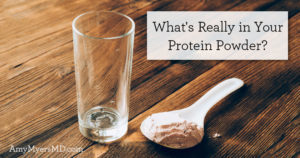
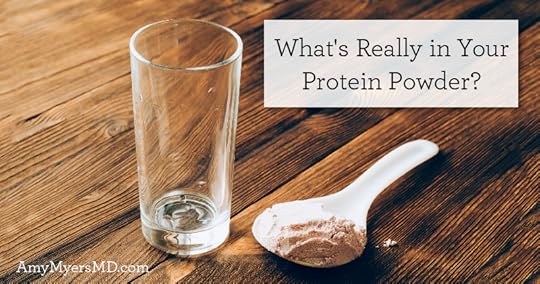
If you are what you eat, we should all be eating plenty of protein because our entire bodies are comprised primarily of protein! Eating sufficient amounts of protein is key for optimal health, especially if you have autoimmunity. After all, protein supports and fuels your entire immune system!
One convenient way to get more protein in your diet is by adding protein powder to your daily smoothie, and there are tons of options out there to choose from–whey, rice, soy, egg and pea–just to name a few. However, many of these options are actually highly inflammatory and can even be loaded with sugar, artificial sweeteners, or other toxic ingredients.
In fact Consumer Reports just uncovered that many of the top-selling protein powders and drinks contain dangerous amounts of heavy metals such as arsenic, cadmium, mercury, and lead, and toxins such as bisphenol A (BPA), a chemical found in some plastic containers and food can liners. These substances have been linked to cancer, brain damage, and reproductive issues. If you are prone to autoimmunity, this can be particularly damaging.
To help you sort through the options to help you discover which type of protein is best for you, I’m going to walk you through the essential health benefits of protein, which ingredients to avoid, and how to find a clean, high-quality source.
Essential Health Benefits of Protein
It is important first to understand the vital role protein plays in our bodies on a daily basis, so we can truly appreciate why we need to make sure we get enough of it in our diets. As a functional medicine doctor, I recommend a diet that focuses on nutrient-dense and colorful organic vegetables, healthy fats, fruits, wild caught fish and organic, grass-fed and pasture-raised meat, pork and poultry. Remember, protein supports your immune system, so this is key for anyone with autoimmunity!
What is Protein?
Proteins are basically long chains of amino acids. There are over 20 different types of amino acids that can be combined to form a protein molecule. The specific sequence of these amino acids determines the protein’s structure and subsequent function. Your muscles and all your organs including your heart, eyes, stomach, and even your skin are built of protein. Protein molecules are the workhorses of your body, because they perform so many key functions which are vital to true health. They function as our antibodies, which fight viruses and bacteria to protect the body. They also function as our enzymes, carrying out most of the body’s chemical reactions, assisting in the formation of new molecules. Protein molecules also serve as our body’s messengers, transmitting vital signals throughout our bodies to coordinate different biological processes between cells, tissues and organs. Finally, protein molecules provide our body’s very structure and support, allowing us to move!1
Our bodies require complete proteins to build and repair every single structure. At the cellular level, our bodies are constantly regenerating, and this requires daily dietary protein intake to operate correctly and efficiently in performing all of these tasks. The necessary complete protein comprised of 9 essential amino acids cannot be generated by our bodies alone–we must get these from the foods we eat. The greatest abundance of protein comes in the form of animal products (meats, fish, eggs and dairy), yet it can also be found in some plant foods. The importance of supplementing our diets, if we cannot guarantee a daily intake of clean, grass-fed or wild-caught protein is irrefutable. Protein is what we’re made of!
I do want to add a quick note for all of the vegans and vegetarians. I, myself, was a vegetarian for over 20 years and I ultimately discovered that this played a big role in why I developed an autoimmune condition. In the years since, I have done extensive research and made a big shift in my own diet, and it’s why I recommend that anyone dealing with autoimmunity add animal protein into your diet.
What to Avoid in Your Protein Powder
While all protein powders tout the health benefits of a protein-rich diet, unfortunately, the hidden toxins and inflammatory ingredients in many protein powders can overshadow the health benefits of increased protein intake. Many of these powders are low-quality, processed with solvents and harmful chemicals. The problems abound with most products on the market today.
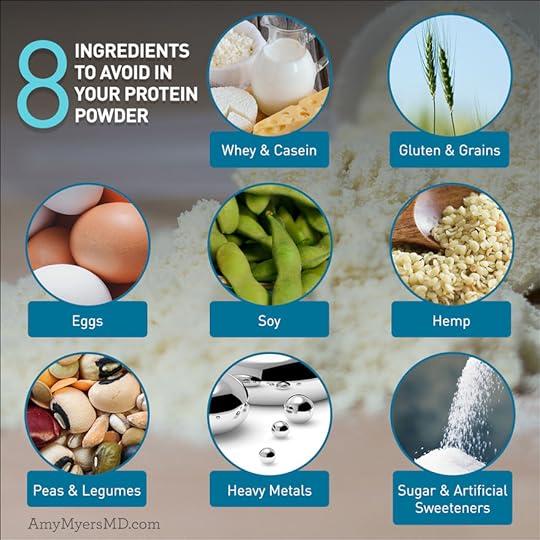
Whey and Casein
Whey and casein, both of which are derived from dairy, are among the most common types of protein powder. They are problematic as dairy is problematic for most of us! This is because dairy is highly inflammatory for a large percentage of the population resulting in digestive issues such as bloating, gas, constipation, and diarrhea. It is also linked to acne.
What’s wrong with dairy? In short, the problem with dairy lies in the sugar, or lactose, and the proteins casein and whey. If we lack the lactase enzyme, our bodies cannot break down the lactose in milk, making us “lactose intolerant.” Casein is a protein with a very similar molecular structure to gluten and 50% of people who are gluten intolerant are casein intolerant as well. Milk, and products made from milk, also can contain genetically engineered bovine growth hormone called rBGH used to increase milk production as well as antibiotics administered to cows to mitigate infections caused from this unnatural excessive milk production.
Gluten & Grains
Gluten is one of the top 2 foods to avoid if you have an autoimmune or thyroid condition. Not all protein powders are gluten-free. Gluten contributes to a leaky gut which then leads you down the path to autoimmune disease and can even prompt your immune system to attack your own tissues.
Rice protein is a common type of vegetarian protein, which is a grain, and grains are on the list of foods to avoid if you have an autoimmune condition, as grains and legumes cause leaky gut.
Eggs
Protein powders sourced from eggs, or containing eggs can be a problem for anyone on the autoimmune spectrum, as eggs can be inflammatory for many people. Just as a seed (plant embryo) protects itself naturally with chemical defenses, so do other embryos, such as eggs. Just like a seed, eggs contain a protective enzyme. The enzyme, called lysozyme, is inflammatory to people with autoimmune conditions, so eggs are on the list of foods to toss.
Soy
A common choice is soy protein powder. This can cause an inflammatory response in the body, as the soy protein nearly always sourced from genetically modified soybeans in the US.
Hemp
Hemp is another choice, which is vegan or plant-based. Hemp is related to marijuana, so it has trace amounts of the psychoactive component tetrahydrocannabinol (THC). Hemp is not considered a complete protein, because it has very low levels of the amino acids lysine and leucine. So, it’s not the most ideal choice!
Peas and Legumes
Pea protein powders are derived from legumes, which contribute to leaky gut–a major culprit in autoimmunity. An issue with vegan protein powders such as hemp and pea, is that plant proteins can be digested more slowly than animal proteins, due in part to their high fiber content. Although this may not be a problem for many people, it can limit the amount of amino acids available for immediate use after exercise, making them a less than ideal protein source.
Sugar and Artificial Sweeteners
Likewise hidden sugars in many protein powders cause a spike in blood sugar, and contribute to inflammation and increased caloric intake unnecessarily. Many protein powders also contain sweetener substitutes, which are artificial, carcinogenic chemicals that we know we should avoid.
Heavy Metals
Consumer Reports just uncovered that many of the top-selling protein powders and drinks contain noticeable amounts of heavy metals, and these metals are more prevalent in plant-based protein powders. They contain on average twice as much lead and measurably higher amounts of other contaminants.
What to Look for in a High-Quality Protein Powder
When looking for a high quality protein powder, to ensure your body is fueled with the necessary amino acids it needs to function optimally, make sure your protein powder meets the following criterion:
Sourced from grass-fed, GMO-, hormone-, and antibiotic-free animals
Free of inflammatory ingredients (gluten, dairy, whey, corn, soy, grains, legumes)
No sugar or artificial sweeteners
No colors, additives, preservatives, dyes or other toxic ingredients
Avoid options with dangerous levels of heavy metals
I literally went 5 years without enjoying a protein smoothie, because I couldn’t find one that met my needs until I created my own protein powder, which is sourced from clean protein and is completely free of inflammatory ingredients. It has also been 3rd-party tested for heavy metal levels and passed with flying colors.
The Myers Way® Paleo Protein is gluten, dairy, and sugar-free, and sourced from non-GMO, hormone- and antibiotic-free, grass-fed beef. Don’t worry, you would never know it from the delicious taste! You also won’t find any other The Myers Way® ‘no-no’s’ including grains, soy, eggs, milk, corn, or legumes. It’s perfect for everyone, especially those following an autoimmune, paleo or ketogenic protocol or simply avoiding inflammatory foods! It contains a 21-26 grams of complete protein per serving (depending on which flavor you choose). It tastes fantastic, and it is incredibly easy to add to your daily routine.
What’s wonderful is that it comes in chocolate, vanilla, and a NEW mocha latte flavor, with a hint of stevia, and also in a plain version without stevia. It is also friendly for those on a ketogenic diet, because it is incredibly low carb. It’s great as a quick morning shake or added into a delicious smoothie. Kids absolutely love it too! And when you purchase it, you’ll receive a FREE recipes eBook with mine and my team’s favorite smoothie recipes!
Plus, I’ve included lots of brand new, amazingly delicious smoothie recipes in The Autoimmune Solution Cookbook, that feature The Myers Way® Paleo Protein!
One of my personal favorite, simple recipes is the following ingredients in my NutriBullet:
1 cup coconut milk
1 scoop Vanilla Paleo Protein Powder
1/2 cup organic frozen berries
1 cup frozen greens
If I want to upgrade my smoothie, I even add in the following:
Collagen Powder to support the lining of my gut
Probiotic Capsule to support my microbiome. It breaks up easily in the blender.
Immune Booster Powder to support my immune system and collagen to support my hair and skin and to help repair a leaky gut
Now you can confidently enjoy a healthy, clean protein powder that is gluten-free, dairy-free, low carb, approved for the The Myers Way® and is delicious! You can have the peace of mind that you are including enough of the most important nutrient in your daily routine, protein–what you’re made of!
Save 15% on The Myers Way® Mocha Latte Paleo Protein!
Are you ready to start your day with the rich, chocolatey goodness of a mocha latte without the guilt? Then allow me introduce you to my brand new flavor of The Myers Way® Paleo Protein: Mocha Latte!
Whether you’re following the Autoimmune Solution Protocol and have been missing coffee, or if you simply love mocha lattes and are looking for a way to enjoy them without all the extra sugar and caffeine, then this protein powder is for you! Made with only clean-sourced ingredients and just a touch of stevia, you won’t have to feel guilty about indulging in a frothy mocha latte anymore! Blend with a bit of non-dairy milk and a few ice cubes, and you’ve got a handy source of complete protein to keep you energized through your busy morning!
Plus, now through Thursday, March 29th at Midnight CST, you can save 15% on all four varieties of The Myers Way® Paleo Protein!
The post What’s Really in Your Protein Powder? appeared first on Amy Myers MD.
Amy Myers's Blog
- Amy Myers's profile
- 74 followers



